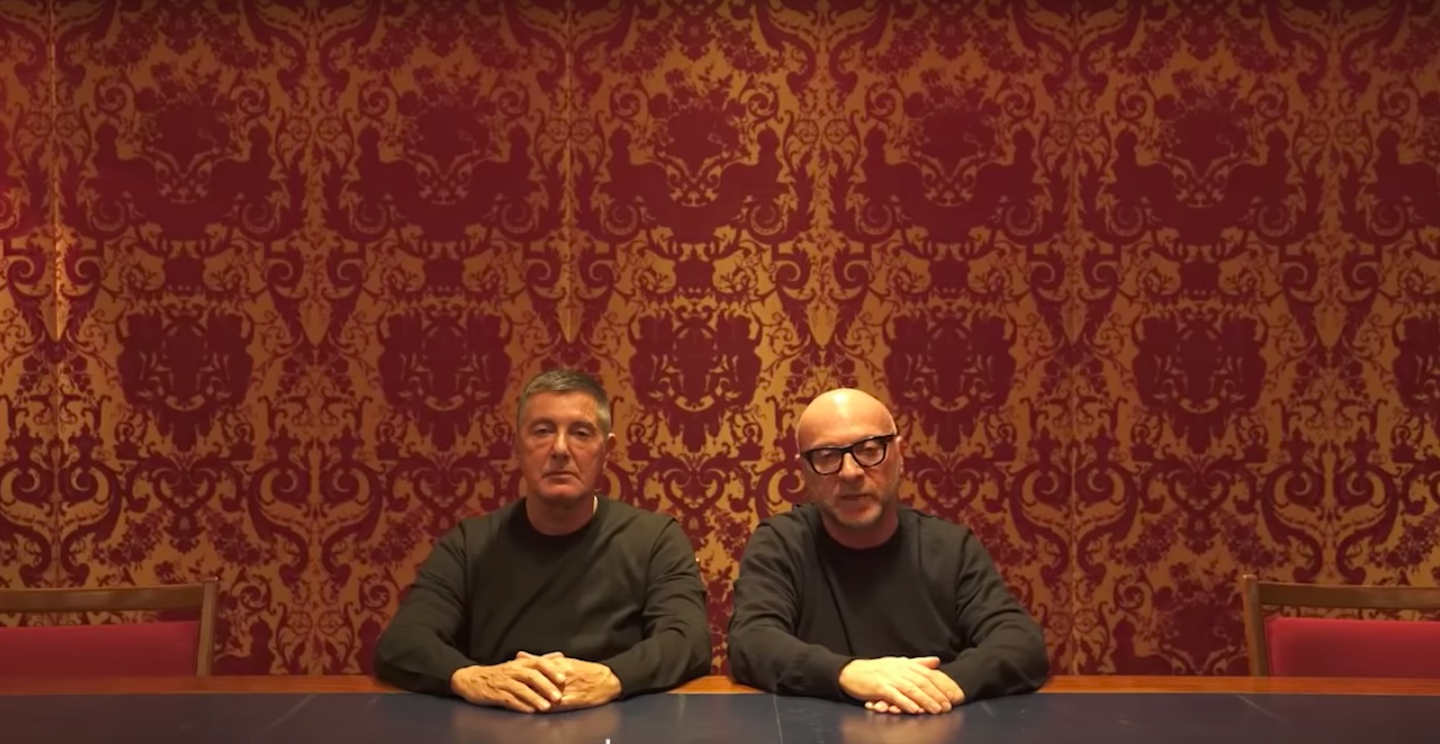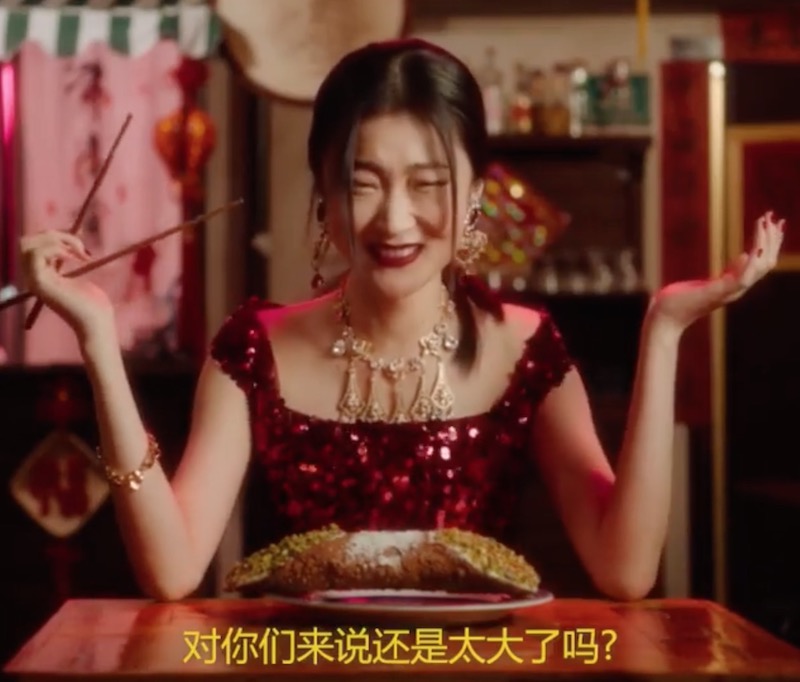
D&G founders Domenico Dolce and Stefano Gabbana apologise in a short video regarding the recent outrage over the brand's racist ad.
Dolce & Gabbana’s co-founders issued an apology yesterday in an effort to stop the escalating backlash against its label after a social media ad campaign soured. In a seemingly rehearsed response, founders Domenico Dolce and Stefano Gabbana expressed their love for Chinese culture.
“Our families have always taught us to respect the various cultures of the world, and for this, we want to apologise if we have made mistakes in interpreting your culture. We have always loved China; we have visited many cities… and certainly we still have much to learn,” Dolce said.
Gabbana added, “We offer our sincerest apologies to Chinese people worldwide.”
Their eponymous fashion brand fell under fire this week for releasing a series of controversial Instagram ads, in which a female Chinese model — dressed in a red, sequined D&G outfit — attempts to eat various Italian dishes with chopsticks. In one involving a cannoli, the male narrator asks in Mandarin, “Is it too huge for you?”

The fiasco intensified when instagram DMs that appeared to be from Gabbana were leaked. Diet Prada, the social media watchdog of the fashion industry, posted screenshots of an exchange between Gabbana and model Michaela Tranova. The leaked comments appeared to show Gabbana describing China as a “country of sh*t”, and insinuating that Tranova herself is racist for “eating dogs”.
D&G have since deleted the Instagram ads and claimed that both its official instagram account, as well as Gabbana’s, were hacked. However, the damage was done.
Not only the backlash led to the last-minute cancellation of its highly-anticipated fashion show in Shanghai, retailers around the world have also pulled the brand’s products from their shelves and websites. In just less than four days, the Italian powerhouse has managed to:
a) Be deserted by Chinese celebrities (including Crouching Tiger, Hidden Dragon’s Zhang Ziyi) and models slated to walk the show.
b) Get its label storefronts plastered with ‘Not Me’, mocking Gabbana’s response to the leaked comments he denied.
c) Get its products removed from Net-a-Porter, the luxury e-tailer headquartered in London and owned by Richemont.
d) Get brand ambassadors axed their contract with D&G. Protestors were also spotted at the brand’s flagship shops in Milan.
Diet Prada also posted a note on its Instagram account on Thursday, presumably written by founder Tony Liu, whose parents are Chinese immigrants. He wrote that D&G’s behaviour is so significant because the racist ideologies he grew up around are now “propagated by two extremely powerful and highly public individuals.”
The apology and hacking excuse, unfortunately, gained almost no traction because of Gabbana’s history of offending others. Business of Fashion noted that the two founders have made numerous appalling statements including referring to babies conceived in vitro fertilisation as ‘synthetic’, calling Selena Gomez ‘ugly’ and describing gladiator sandals as ‘slave sandals’. With a brand so impervious to controversies, the designers have been accused of just crying wolf.
From one PR disaster to another: What do local PR practitioners say?
Needless to say, D&G is experiencing the worst branding crisis in the world’s largest luxury market. Not only the founders over-stepped their mark, they have managed to cause long-term damage to the brand. We asked three local PR practitioners what they thought about the brouhaha and how this situation could have been handled.
Amri Rahim, lifestyle PR consultant
“This episode is, unfortunately, not the first abusive and tone-deaf behaviour by Stefano Gabbana. He’s constantly proving to be a liability to the D&G brand and business. The best decision the brand can make now is to distance itself from the man [Gabbana]. Show that the brand does not share the racist and prejudiced thinking of its co-founder and is committed to providing the best products and service to everyone, everywhere.”
Choon, Founder and director of C Creative Communications
“In the first place, they should’ve been more sensitive with the reactions of the citizens of China towards the ads. If the brand claims it wants to show its love for China, wouldn’t it be more genuine to post a simple video of the designers sending their love to China to create bigger anticipation for their show? The same move can also be used to counter the negative reactions to the ‘chopstick ads’.
“Plus, it’s too late to ‘show their love to China’ when all the damages are done. It sounded like a last-ditch effort to defend their brand. People no longer cared if the messages are hacked. This is a lesson for their PR team, as well as the designers — to be culturally sensitive and to react in a timely manner. This is also for them to learn that you do not mess with the people of China as they're just as discerning as other global consumers out there.”
Ying Nee Ooi, Former journalist and founding managing director of Commas PR
“Morally, I wouldn’t work with a client who’s racist. And if it happens that a client of mine turned out to be one, the easy thing to do is to cut ties with the least financial exposure possible.”
Moving forward
The Chinese government, though, seems to limit the fallout between the brand and the country. According to a report by the New York Times, Chinese Foreign Ministry spokesman Geng Shuang said, “The Chinese side does not want this matter to rise to a diplomatic issue.”
The crisis for D&G still showed no sign of easing as customers in mainland China and Hong Kong are returning their D&G items. This is a clear demonstration that retailers should respect the consumers they profit from. To quote Diet Prada:
“You are not bestowing them a gift… you’re taking their money.”


